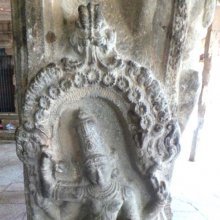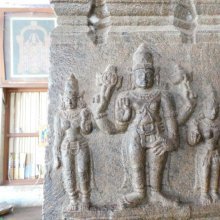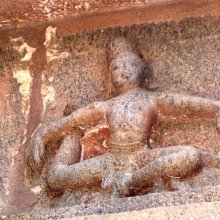Control: 2 definitions
Introduction:
Control means something in Buddhism, Pali, Hinduism, Sanskrit. If you want to know the exact meaning, history, etymology or English translation of this term then check out the descriptions on this page. Add your comment or reference to a book if you want to contribute to this summary article.
Images (photo gallery)
(+8 more images available)
In Hinduism
Yoga (school of philosophy)
Source: ORA: Amanaska (king of all yogas): A Critical Edition and Annotated Translation by Jason BirchControl (over the world) refers to one of the “eight common Yogic paranormal powers”, represents one of the various signs and paranormal powers (siddhi) experienced by the Yoga practicioner, according to the Amanaska Yoga treatise.—The last fifty-two verses of the Amanaska’s first chapter describe a temporal sequence of psychosomatic signs and paranormal powers (siddhi) brought about by absorption (laya). In the Amanaska, The 8 common yogic paranormal powers are, [e.g., the power of control over the world (vaśitva)], [...] This list is similar to that given in Pātañjalayogaśāstra 3.45.

Yoga is originally considered a branch of Hindu philosophy (astika), but both ancient and modern Yoga combine the physical, mental and spiritual. Yoga teaches various physical techniques also known as āsanas (postures), used for various purposes (eg., meditation, contemplation, relaxation).
In Buddhism
Tibetan Buddhism (Vajrayana or tantric Buddhism)
Source: ORA: Amanaska (king of all yogas): (Tibetan Buddhism)(Gaining) Control over Gods, Demons and Men is denoted by the Sanskrit term Vaśa, according to verse 14.24bd-27 of the Laghuśaṃvara, an ancient Buddhist Yoginī Tantra.—Accordingly: “The Sādhaka [who has] the Siddhi of speech can certainly attract a king or queen by [merely] thinking [it]. He quickly controls (vaśa) gods, demons and men. When angry, he can kill with his speech and drive away his adversary. The practitioner can thus effect a curse with his speech [...]”.

Tibetan Buddhism includes schools such as Nyingma, Kadampa, Kagyu and Gelug. Their primary canon of literature is divided in two broad categories: The Kangyur, which consists of Buddha’s words, and the Tengyur, which includes commentaries from various sources. Esotericism and tantra techniques (vajrayāna) are collected indepently.
See also (Relevant definitions)
Starts with: Control Effort, Control in bodily action, Control in mind, Control in speech, Control over hearing, Control over sight, Control over smell, Control over taste, Control over tocuh.
Full-text (+3622): Samyama, Pranayama, Vashitva, Samyamin, Niyamaka, Vasa, Samyamana, Svavasha, Yanta, Vagdanda, Ankusha, Yami, Manodanda, Svadhina, Patti, Senapati, Rashtreshvara, Gupti, Damopeta, Sarvadhikara.
Relevant text
Search found 411 books and stories containing Control; (plurals include: Controls). You can also click to the full overview containing English textual excerpts. Below are direct links for the most relevant articles:
The Patthanuddesa Dipani (by Mahathera Ledi Sayadaw)
Yoga-sutras (with Vyasa and Vachaspati Mishra) (by Rama Prasada)
Sūtra 2.55 < [Book 2 - Practice (Sādhana)]
Sūtra 3.44 < [Book 3 - Attainment (Vibhūti or Siddhi)]
Sūtra 2.41 < [Book 2 - Practice (Sādhana)]
The Buddhist Path to Enlightenment (study) (by Dr Kala Acharya)
4.2. The Five Faculties (Introduction) < [Chapter 2 - Five Groups of Factor]
5.2. Mental Power of Effort or Energy (Vīriyabala or Vīrya) < [Chapter 2 - Five Groups of Factor]
4.1. The Meaning of Indriya (Faculties) < [Chapter 2 - Five Groups of Factor]
Concept of Mind in the Major Upanishads (by Gisha K. Narayanan)
3. The Psychological aspects in the Kaṭhopaniṣad < [Chapter 5 - The Psychological aspects as reflected in the Upaniṣads]
10. Resume < [Chapter 3 - The concept of Mind in the Darśanas]
6. The Concept of Mind in the Muṇḍakopaniṣad < [Chapter 4 - The concept of Mind in the Major Upaniṣads]
The Markandeya Purana (by Frederick Eden Pargiter)
Triple Stream < [January – March, 1998]
The Shape of the Universe in Pincher Martin < [July – September 1977]
The States and Federation < [May-June 1933]
Related products
(+109 more products available)











